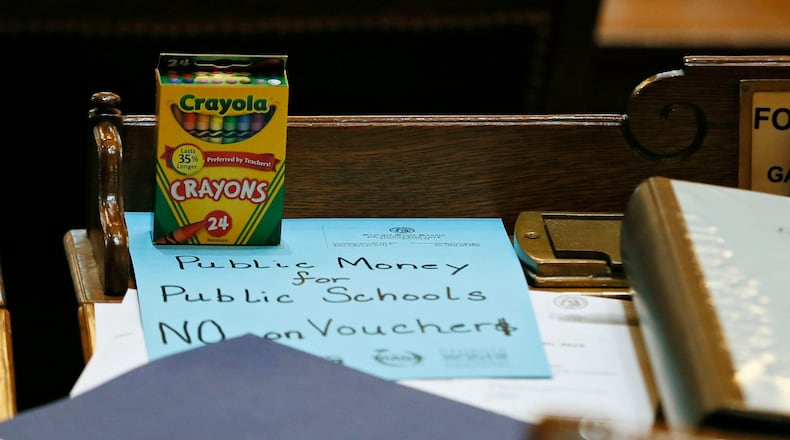Vouchers are expected to be back on the table this year in the General Assembly.
Last year, neither Senate Bill 173 nor House Bill 301 moved forward; both would create education savings accounts, which essentially is another name for vouchers that allow parents to use tax dollars to send their kids to private schools.
Voucher proponents are expected to push the cause again this year. The legislation has the support of the governor and the lieutenant governor.
On its face, an education saving account is broader than a voucher in that it allows parents to spend public dollars on a range of educational expenses, including tutoring, curriculum materials and therapies. However, in the few states with such accounts, almost all the money underwrites private school tuition.
In a recent survey by the Professional Association of Georgia Educators of legislative priorities, nearly 60% of teachers opposed education savings accounts. Twenty percent of survey respondents either knew too little about ESAs to form an opinion or were neutral, while another 20% supported them.
In this guest column, state Sen. Elena Parent, D-Atlanta, explains why she opposes them. An attorney, Parent was elected to the Georgia House in 2010 and to the state Senate in 2014. Parent serves as the vice president of the Senate Democratic Caucus.
By Elena Parent
With Georgia’s budget facing its first shortfall since the Great Recession, the General Assembly should not spend hundreds of millions of dollars on a risky program that does nothing to improve Georgia’s public schools.
Yet. Georgia’s Republican leadership plans to do just that with an “Education Savings Account” program that provides vouchers for private school students. This would be on top of the $100 million each year the state already spends on its voucher-like Tax Credit Scholarship Program.
Education Savings Accounts allow parents to use state money to pay for private school tuition. By using taxpayer dollars to subsidize private school tuition, less money is left to fund Georgia’s already financially strapped public schools.
Georgia now spends less per student on public education than the national average. It cannot afford to shortchange our students even more. Adding insult to injury, most of Education Savings Account dollars would go to higher-income families, according to a report by the Professional Association of Georgia Educators.
Even though school voucher advocates claim otherwise, research shows that voucher programs do not improve academic outcomes. According to the National Educational Policy Center, several recent large-scale studies show either worse student outcomes or no effect on student achievement. Students who used vouchers in Indiana and Louisiana actually saw their scores on standardized reading and math tests drop.
In Georgia, a statewide voucher program would do the greatest harm to rural communities. Student achievement in these areas is already well below the national average. A recent report by the Rural School and Community Trust ranked Georgia near the bottom of the nation for our poor levels of funding and academic achievement in rural schools.
Many students in rural regions of Georgia, the ones harmed most by diverting funds from public schools, would not even be able to take advantage of the vouchers, because private schools are uncommon in these areas. For these rural students, no realistic choice exists: their local public schools lose funding while students from other communities benefit. As a state, it is our responsibility to better fund rural public schools, not take money away.
Georgia needs to do more across the state to help students improve academically. But school vouchers make a bad situation worse. A new school voucher program will only harm most students, as they have done in other states. Particularly in a year when our state is experiencing a budget shortfall and looking at making tough cuts, vouchers should be a non-starter.
About the Author
Keep Reading
The Latest
Featured


